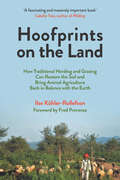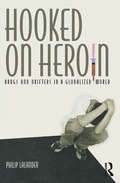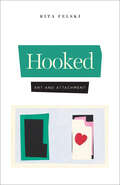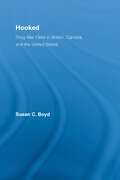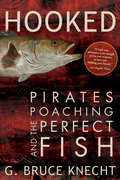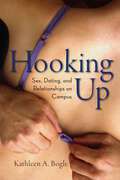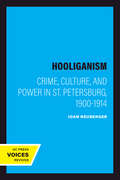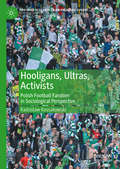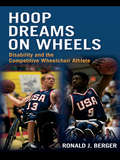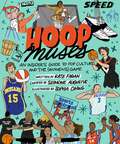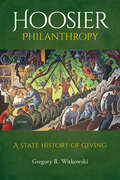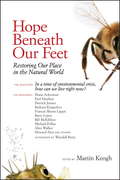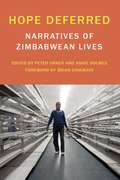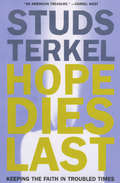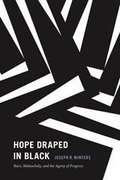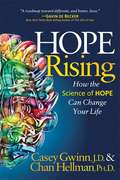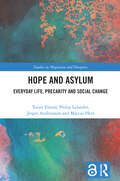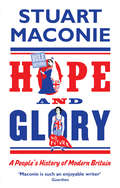- Table View
- List View
Hoofprints on the Land: How Traditional Herding and Grazing Can Restore the Soil and Bring Animal Agriculture Back in Balance with the Earth
by Ilse Köhler-RollefsonPerfect for fans of English Pastoral and Wilding, Hoofprints on the Land shows that herding cultures are not a thing of the past but a regenerative model for our future. Hoofprints on the Land is a fascinating and lyrical book exploring the deep and ancient working partnerships between people and animals. UN advocate and camel conservationist Ilse Köhler-Rollefson writes a passionate rallying cry for those invisible and forgotten herding cultures that exist all over the world, and how by embracing these traditional nomadic practices, we can help restore and regenerate the Earth. Ilse has spent the last 30 years living with and studying the Raika camel herders in Rajasthan, India, and she shows how pastoralists can address many of the problems humanity faces. Whether it be sheep, cattle, reindeer, camels, alpacas, goats, or yaks—this ancient and natural means of keeping livestock challenges the myth that animal-free agriculture is the only way forward for a healthy planet. From the need to produce food more sustainably and equitably to the consequences of climate change, land degradation and loss of biodiversity, we can learn from pastoralists to help repair the human relationship with livestock to return to a model of intelligent cooperation rather than dominance. As Ilse writes: “Herding is therapy, not just for the planet, but also for our souls.”
Hoofprints on the Land: How Traditional Herding and Grazing Can Restore the Soil and Bring Animal Agriculture Back in Balance with the Earth
by Ilse Köhler-RollefsonPerfect for fans of English Pastoral and Wilding, Hoofprints on the Land shows that herding cultures are not a thing of the past but a regenerative model for our future.Hoofprints on the Land is a fascinating and lyrical book exploring the deep and ancient working partnerships between people and animals. UN advocate and camel conservationist Ilse Köhler-Rollefson writes a passionate rallying cry for those invisible and forgotten herding cultures that exist all over the world, and how by embracing these traditional nomadic practices, we can help restore and regenerate the Earth. Ilse has spent the last 30 years living with and studying the Raika camel herders in Rajasthan, India, and she shows how pastoralists can address many of the problems humanity faces.Whether it be sheep, cattle, reindeer, camels, alpacas, goats, or yaks—this ancient and natural means of keeping livestock challenges the myth that animal-free agriculture is the only way forward for a healthy planet.From the need to produce food more sustainably and equitably to the consequences of climate change, land degradation and loss of biodiversity, we can learn from pastoralists to help repair the human relationship with livestock to return to a model of intelligent cooperation rather than dominance.As Ilse writes: &“Herding is therapy, not just for the planet, but also for our souls.&”
Hooked on Heroin: Drugs and Drifters in a Globalized World
by Philip LalanderAlarmingly, heroin is growing in popularity amongst young people. This is despite the fact that it is - more than any other drug - associated with failure, death, misery and poverty. This book explores why people are tempted by heroin and how globalization has played a key role in increasing the number of abusers. Rather than offer lofty and abstract theories on addiction, the author grounds his study firmly in the day-to-day lives of heroin users themselves. Norrköping in Sweden is a mid-sized former industrial city like countless others throughout the world. It has suffered high unemployment as a result of its rapid decline as a hub of commerce. Once well known for housing the giant telecommunications company Ericsson, it sadly gains more notoriety today through its associations with heroin, which continues to be the drug of choice for Norrköping's young people. Through privileged access to users themselves, Lalander is able to show us the real motivations and lifestyle choices behind addiction. Personal testimonies candidly expose the underground activities of a thriving subculture and spark vexing questions as to why these young people choose to flirt with fatality. What media representations influence heroin users? Is this phenomenon the inevitable by-product of modern life? What are the root causes at play? Lalander's in-depth investigation overturns many of the stereotypes associated with heroin use. Accessible and gripping, Hooked on Heroin brings a disturbing reality closer to home and shows how global and local practices are intimately linked.
Hooked: Art and Attachment
by Rita Felski“Examines the way we connect to novels, films, paintings and music, and argues that our enthusiasms should be an integral part of conversations about art.” —Helen Thaventhiran, London Review of BooksHow does a novel entice or enlist us? How does a song surprise or seduce us? Why do we bristle when a friend belittles a book we love, or fall into a funk when a favored TV series comes to an end? What characterizes the aesthetic experiences of feeling captivated by works of art? In Hooked, Rita Felski challenges the ethos of critical aloofness that is a part of modern intellectuals’ self-image. The result is sure to be as widely read as Felski’s book, The Limits of Critique.Wresting the language of affinity away from accusations of sticky sentiment and manipulative marketing, Felski argues that “being hooked” is as fundamental to the appreciation of high art as to the enjoyment of popular culture. Hooked zeroes in on three attachment devices that connect audiences to works of art: identification, attunement, and interpretation. Drawing on examples from literature, film, music, and painting—from Joni Mitchell to Matisse, from Thomas Bernhard to Thelma and Louise—Felski brings the language of attachment into the academy. Hooked returns us to the fundamentals of aesthetic experience, showing that the social meanings of artworks are generated not just by critics, but also by the responses of captivated audiences.“[Hooked] is an exposé aimed at critics who disavow their personal allegiances.” —Matthew Rubery, Public Books“There are many insights in Hooked that will facilitate a productive interdisciplinary conversation about aesthetics, politics, and the future of critique.” —Michael Gallope, nonsite.org
Hooked: Drug War Films In Britain, Canada, And The United States (Routledge Advances in Criminology)
by Susan C. BoydDrug prohibition emerged at the same time as the discovery of film, and their histories intersect in interesting ways. This book examines the ideological assumptions embedded in the narrative and imagery of one hundred fictional drug films produced in Britain, Canada, and the U.S. from 1912 to 2006, including Broken Blossoms, Reefer Madness, The Trip, Superfly, Withnail and I, Traffik, Traffic, Layer Cake, Harold and Kumar Go to White Castle, Trailer Park Boys, and more. Boyd focuses on past and contemporary illegal drug discourse about users, traffickers, drug treatment, and the intersection of criminal justice with counterculture, alternative, and stoner flicks. She provides a socio-historical and cultural criminological perspective, and an analysis of race, class and gender representations in illegal drug films. This illuminating work will be an essential text for a wide range of students and scholars in the fields of criminology, sociology, media, gender and women’s studies, drug studies, and cultural studies.
Hooked: Pirates, Poaching, and the Perfect Fish
by G. Bruce KnechtThis modern pirate yarn has all the makings of a great true adventure tale and explores the ways our culinary tastes have all manner of unintended consequences for the world around us. Hooked tells the story of the poaching of the Patagonian toothfish (known to Americans as "Chilean Sea Bass") and is built around the pursuit of the illegal fishing vessel Viarsa by an Australian patrol boat, Southern Supporter, in one of the longest pursuits in maritime history.Author G. Bruce Knecht chronicles how an obscure fish merchant in California "discovered" and renamed the fish, kicking off a worldwide craze for a fish no one had ever heard of and everyone had to have. With demand exploding, pirates were only too happy to satisfy our taste for Chilean Sea Bass. From the world's most treacherous waters to its most fabulous kitchens, Hooked is at once a thrilling tale and a revelatory popular history that will appeal to a diverse group of readers.
Hooking Up: Sex, Dating, and Relationships on Campus
by Kathleen A. BogleA closer look into the new sexual culture on college campusesIt happens every weekend: In a haze of hormones and alcohol, groups of male and female college students meet at a frat party, a bar, or hanging out in a dorm room, and then hook up for an evening of sex first, questions later. As casually as the sexual encounter begins, so it often ends with no strings attached; after all, it was “just a hook up.” While a hook up might mean anything from kissing to oral sex to going all the way, the lack of commitment is paramount.Hooking Up is an intimate look at how and why college students get together, what hooking up means to them, and why it has replaced dating on college campuses. In surprisingly frank interviews, students reveal the circumstances that have led to the rise of the booty call and the death of dinner-and-a-movie. Whether it is an expression of postfeminist independence or a form of youthful rebellion, hooking up has become the only game in town on many campuses.In Hooking Up, Kathleen A. Bogle argues that college life itself promotes casual relationships among students on campus. The book sheds light on everything from the differences in what young men and women want from a hook up to why freshmen girls are more likely to hook up than their upper-class sisters and the effects this period has on the sexual and romantic relationships of both men and women after college. Importantly, she shows us that the standards for young men and women are not as different as they used to be, as women talk about “friends with benefits” and “one and done” hook ups.Breaking through many misconceptions about casual sex on college campuses, Hooking Up is the first book to understand the new sexual culture on its own terms, with vivid real-life stories of young men and women as they navigate the newest sexual revolution.
Hoolifan: 30 Years of Hurt
by Martin Knight Martin KingHoolifan is the story of one man, Martin King, and his experiences spanning three decades with the country's foremost soccer gang. Chelsea have always been at the cutting edge of football violence, and King himself was at the heart of the evolving Chelsea mob for some 30 years. From his first visit to a football ground in the early 1960s, he charts his development from a rattle-waving child through to a fully fledged member of the notorious Chelsea Shed in the 1970s and finally to his exploits as a key player in the most feared football gang of the 1980s and 1990s - the so-called Chelsea Headhunters.King describes the leading characters of the various eras, not just from Chelsea but from across the country. He also records every clash, ambush and act of revenge in vivid detail, as well as the camaraderie and style of this most infamous soccer gang. This is not just another book on the well-trodden subject of football hooliganism, as, unlike so many authors, Martin King makes no attempt to distance himself from the violence and leaves readers to draw their own conclusions. At times provocative, often humorous and always honest, Hoolifan places the phenomenon of football hooliganism in its true social context.
Hooliganism: Crime, Culture, and Power in St. Petersburg, 1900-1914 (Studies on the History of Society and Culture #19)
by Joan NeubergerIn this pioneering analysis of diffuse underclass anger that simmers in many societies, Joan Neuberger takes us to the streets of St. Petersburg in 1900-1914 to show us how the phenomenon labeled hooliganism came to symbolize all that was wrong with the modern city: increasing hostility between classes, society's failure to "civilize" the poor, the desperation of the destitute, and the proliferation of violence in public spaces.
Hooligans, Ultras, Activists: Polish Football Fandom in Sociological Perspective (Football Research in an Enlarged Europe)
by Radosław KossakowskiThis book is the first comprehensive attempt to identify the deeper causes that have shaped contemporary behaviour patterns and motivations among football fans in Poland. Fan culture in Poland has long been based on a distinctively grassroots, spontaneous movements that ruled out any cooperation with local authorities and sports organizations. The activity of supporter groups has regularly failed to meet the principles set by official bodies, intentionally breaching the moral and legal standards of the day. Based on data derived from ethnographic fieldwork, content analysis of fan journals, magazines, social media and online forums, as well as a wide range of qualitative interviews conducted over the years, the book analyses the ways in which fandom culture in Poland has evolved: from its moderate beginnings in the shadows of a communist regime in the 1970’s, through the anomic, ‘uncivilized’ and pathological decade of the 1990’s, to the peculiar culture based on strong cohesion, capabilities of social mobilization and emerging 'resistance identity' in the 21st century. It thus provides a detailed analysis of Polish fandom’s multi-dimensional structure, and will be of interest to students and academics interested in the growing field of football research, as well as those researching the transformation of Central and Eastern Europe, or more generally in European Studies.
Hoop Dreams on Wheels: Disability and the Competitive Wheelchair Athlete (Sociology Re-Wired)
by Ronald BergerHoop Dreams on Wheels is a life-history study of wheelchair athletes associated with a premier collegiate wheelchair basketball program. The book, which grapples with the intersection of biography and history in society, situates the study in broader context with background on the history and sociology of disability and disability sports. It documents the development and evolution of the basketball program and tells the individual life stories of the athletes, highlighting the formative interpersonal and institutional experiences that influenced their agentive actions and that helped them achieve success in wheelchair sports. It also examines divisions within the disability community that reveal both empowering and disempowering aspects of competitive wheelchair athletics, and it explores some of the complexities and dilemmas of disability identity in contemporary society. The book is intended to be read by a general audience as well as by students in college courses on disability, sports, social problems, deviance, medical sociology and anthropology, and introductory sociology. It also will be of interest to scholars in the sociology of disability, sociology of sports, and medical humanities, as well as life-history researchers and professionals in the fields of physical education, therapeutic recreation, and rehabilitative counseling.
Hoop Muses: An Insider's Guide to Pop Culture and the (Women's) Game
by Kate Fagan Seimone Augustus&“In vibrant color and style, Hoops Muses tells the vital stories that celebrate the history and tradition of our game.&” —Sue Bird, WNBA legendHoops Muses is an homage to the game, bringing style and flair to all the details, moments, and people who have shaped the collective world of (women&’s) hoops.Hoops Muses will take us through time – literally. We begin in the future, in 2072, on the night of the WNBA&’s 75th Anniversary, as New York Liberty phenom Jacklyn Jones is paid a visit by one of basketball&’s long-ago (wink, wink) greats. This unlikely duo then goes on a sweeping, roundtrip adventure through basketball history, starting at the very beginning: Springfield, 1891. As the years pass, they learn the roots of the game (think: the first-ever collegiate game between Stanford and Cal, where men scaled the walls for a peek inside, or, the legend of Chicago&’s Club Store Co-Eds, the all-Black barnstorming squad of the 1930s). AND as the early 20th century morphs into modern times, they see the game grow, the milestones reached. On their journey, they learn about the teams and the women (along with a few men) who helped build the foundation on which The Future will be built: -Fort Shaw and the 1904 World Championship -Pat Summitt and the early years of the Lady Vols -Delta State, featuring Margaret Wade and Lusia Harris -Cheryl Miller and Hollywood&’s USC Trojans -UConn-Tennessee and the &“Sliding Doors&” moment that sparked their rivalry Plus, they have front-row seats to a whole lot of quirky, blissful fandom, including … The Movies That Should Have Been WNBA Jam The Moments The Shots To be a (women&’s) hooper is to be part of a long and proud tradition … but one not often celebrated in popular culture. Hoops Muses is here to change that.
Hoosier Hysteria: A Fateful Year in the Crosshairs of Race in America
by Meri Henriques VahlIndiana University, September 1963. Meri Henriques, a naïve freshman from New York, arrives on campus thinking she&’s about to enroll at an idyllic Midwestern college. Instead, she discovers a storm is brewing. An intriguing cast of characters inhabits Meri&’s new and often troubled world: Katherine &“Pixie&” Gates, Meri&’s charming and quirky roommate; Rachel, brilliant and sarcastic fellow New Yorker; Daniel, a tough radical with a tender heart; folk singer Derek Stone, Meri&’s crush; and Shennandoah Waters, a white coed who only dates black men or exotic foreigners, much to her ultra-conservative parents&’ horror. Over the course of Meri&’s first year at college, tragedy strikes twice: John Kennedy is assassinated, and a young, black IU basketball player is castrated and thrown into a ditch—murdered for dating a white coed. And finally, that year&’s commencement ceremonies bring an infamous symbol of white supremacy to campus, endangering anyone who dared to protest—thrusting Meri into the middle of violent and escalating racial tensions. Vivid and compelling, Hoosier Hysteria is a timely story of prejudice and political unrest that, today more than ever before, must be told.
Hoosier Philanthropy: A State History of Giving
by James H. Madison Peter Weber Nicole Etcheson David P. King Xiaoyun Wang Tyrone McKinley Freeman William H. Schneider Katherine Badertscher Clay Robbins Ruth C. Crocker James J. Connelly Paul C. Pribbenow Caitlin Crowley Elizabeth J. Van Allen Chen Ji Amanda Koch Ruth K. Hansen Philip D. ByersThe first in-depth history of philanthropy in Indiana. Philanthropy has been central to the development of public life in Indiana over the past two centuries. Hoosier Philanthropy explores the role of philanthropy in the Hoosier state, showing how voluntary action within Indiana has created and supported multiple visions of societal good. Featuring 15 articles, Hoosier Philanthropy charts the influence of different types of nonprofit Hoosier organizations and people, including foundations, service providers, volunteers, and individual donors.
Hoosiers: A New History of Indiana
by James H. MadisonThe story of this Midwestern state and its people, past and present: &“An entertaining and fast read.&” ―Indianapolis Star Who are the people called Hoosiers? What are their stories? Two centuries ago, on the Indiana frontier, they were settlers who created a way of life they passed to later generations. They came to value individual freedom and distrusted government, even as they demanded that government remove Indians, sell them land, and bring democracy. Down to the present, Hoosiers have remained wary of government power and have taken care to guard their tax dollars and their personal independence. Yet the people of Indiana have always accommodated change, exchanging log cabins and spinning wheels for railroads, cities, and factories in the nineteenth century, automobiles, suburbs, and foreign investment in the twentieth. The present has brought new issues and challenges, as Indiana&’s citizens respond to a rapidly changing world. James H. Madison&’s sparkling new history tells the stories of these Hoosiers, offering an invigorating view of one of America&’s distinctive states and the long and fascinating journey of its people.
Hop on Pop: The Politics and Pleasures of Popular Culture
by Henry Jenkins Tara Mcpherson Jane ShattucHop on Pop showcases the work of a new generation of scholars--from fields such as media studies, literature, cinema, and cultural studies--whose writing has been informed by their ongoing involvement with popular culture and who draw insight from their lived experiences as critics, fans, and consumers. Proceeding from their deep political commitment to a new kind of populist grassroots politics, these writers challenge old modes of studying the everyday. As they rework traditional scholarly language, they search for new ways to write about our complex and compelling engagements with the politics and pleasures of popular culture and sketch a new and lively vocabulary for the field of cultural studies. The essays cover a wide and colorful array of subjects including pro wrestling, the computer games Myst and Doom, soap operas, baseball card collecting, the Tour de France, karaoke, lesbian desire in the Wizard of Oz, Internet fandom for the series Babylon 5, and the stress-management industry. Broader themes examined include the origins of popular culture, the aesthetics and politics of performance, and the social and cultural processes by which objects and practices are deemed tasteful or tasteless. The commitment that binds the contributors is to an emergent perspective in cultural studies, one that engages with popular culture as the culture that "sticks to the skin," that becomes so much a part of us that it becomes increasingly difficult to examine it from a distance. By refusing to deny or rationalize their own often contradictory identifications with popular culture, the contributors ensure that the volume as a whole reflects the immediacy and vibrancy of its objects of study. Hop on Pop will appeal to those engaged in the study of popular culture, American studies, cultural studies, cinema and visual studies, as well as to the general educated reader. Contributors. John Bloom, Gerry Bloustein, Aniko Bodroghkozy, Diane Brooks, Peter Chvany, Elana Crane, Alexander Doty, Rob Drew, Stephen Duncombe, Nick Evans, Eric Freedman, Joy Fuqua, Tony Grajeda, Katherine Green, John Hartley, Heather Hendershot, Henry Jenkins, Eithne Johnson, Louis Kaplan, Maria Koundoura, Sharon Mazer, Anna McCarthy, Tara McPherson, Angela Ndalianis, Edward O'Neill, Catherine Palmer, Roberta Pearson, Elayne Rapping, Eric Schaefer, Jane Shattuc, Greg Smith, Ellen Strain, Matthew Tinkhom, William Uricchio, Amy Villarego, Robyn Warhol, Charles Weigl, Alan Wexelblat, Pamela Robertson Wojcik, Nabeel Zuberi
Hope Beneath Our Feet: Restoring Our Place in the Natural World
by Barbara Kingsolver Alice Walker Howard Zinn Michael Pollan Martin KeoghThe environmental "tipping point" we approach is more palpable each day, and people are seeing it in ways they can no longer ignore--we need only turn on the news to hear the litany of what is wrong around us. Serious reflection, inspiration, and direction on how to approach the future are now critical. Hope Beneath Our Feet creates a space for change with stories, meditations, and essays that address the question, "If our world is facing an imminent environmental catastrophe, how do I live my life right now?" This collection provides tools, both practical and spiritual, to those who care about our world and to those who are just now realizing they need to care. Featuring prominent environmentalists, artists, CEOs, grassroots activists, religious figures, scientists, policy makers, and indigenous leaders, Hope Beneath Our Feet shows readers how to find constructive ways to channel their energies and fight despair with engagement and participation. Presenting diverse strategies for change as well as grounds for hope, the contributors to this anthology celebrate the ways in which we can all engage in beneficial action for ourselves, our communities, and the world.Contributors include: Diane Ackerman, Paul Hawken, Derrick Jensen, Barbara Kingsolver, Francis Moore Lappé, Barry Lopez, Bill McKibben, Michael Pollan, Alice Walker, Howard Zinn.
Hope Deferred
by Peter Orner Annie HolmesThe situation in Zimbabwe represents one of the worst humanitarian emergencies today. This book asks the question: How did a country with so much promise - a stellar education system, a growing middle class, a sophisticated economic infrastructure, a liberal constitution, an independent judiciary, and many of the trappings of Western democracy - go so wrong? In their own words, Zimbabweans recount their experiences of losing their homes, land, livelihoods, and families as a direct result of political violence. They describe being tortured in detention, firebombed at work, or beaten up or raped to "punish" votes for the opposition. Those forced to flee to neighboring countries recount their escapes: cutting through fences, swimming across crocodile-infested rivers, and entrusting themselves to human smugglers. This book includes Zimbabweans of every age, class, and political conviction, from farm laborers to academics, doctors to artists, opposition leaders to ordinary Zimbabweans; men and women simply trying to survive as a once-thriving nation heads for collapse.
Hope Diamond: The Legendary History of a Cursed Gem
by Richard Kurin David J. SkortonThe true story behind the most famous-and infamous-stone in the world. The Hope diamond is not only exceptionally beautiful it has a long and incredibly colorful history. That history - spread over three continents - features diamond mining in India, the French Revolution, the machinations of British King George IV, the Gilded Age in America and a number of very clever jewelers including Pierre Cartier and Harry Winston. In the 20th century, the myth of the Hope diamond curse made the diamond more notorious and famous than ever before, but it is only one small piece of a long and lustrous history. Dr. Kurin, who is a cultural anthropologist, has spent over a decade on the trail of the Hope, from India, to France, Germany, Russia, Switzerland, and England. His narrative is filled with fascinating places and people - from the fabled diamond city of Golconda to the fabulously rich heiress Evalyn McLean to Jackie Kennedy and her pivotal role in one of the Hopes few 20th century trips abroad.
Hope Dies Last: Keeping the Faith In Troubled Times
by Studs TerkelAmerica&’s most inspirational voices, in their own words: &“If you&’re looking for a reason to act and dream again, you&’ll find it in the pages of this book&” (Chicago Tribune). Published when Studs Terkel was ninety-one years old, this astonishing oral history tackles one of the famed journalist&’s most elusive subjects: Hope. Where does it come from? What are its essential qualities? How do we sustain it in the darkest of times? An alternative, more personal chronicle of the &“American century,&” Hope Dies Last is a testament to the indefatigable spirit that Studs has always embodied, and an inheritance for those who, by taking a stand, are making concrete the dreams of today. A former death row inmate who served nearly twenty years for a crime he did not commit discusses his never-ending fight for justice. Tom Hayden, author of The Port Huron Statement, contemplates the legacy of 1960s student activism. Liberal economist John Kenneth Galbraith reflects on the enduring problem of corporate malfeasance. From a doctor who teaches his young students compassion to the retired brigadier general who flew the Enola Gay over Hiroshima, these interviews tell us much about the power of the American dream and the force of individuals who advocate for a better world. With grace and warmth, Terkel&’s subjects express their secret hopes and dreams. Taken together, this collection of interviews tells an inspiring story of optimism and persistence, told in voices that resonate with the eloquence of conviction. &“The value of Hope Dies Last lies not in what it teaches readers about its narrow subject, but in the fascinating stories it reveals, and the insight it allows into the vast range of human experience.&” —The A.V. Club &“Very Terkelesque—by now the man requires an adjective of his own.&” —Margaret Atwood, The New York Times Review of Books &“An American treasure.&” —Cornel West
Hope Draped in Black: Race, Melancholy, and the Agony of Progress
by Joseph R. WintersIn Hope Draped in Black Joseph R. Winters responds to the enduring belief that America follows a constant trajectory of racial progress. Such notions--like those that suggested the passage into a postracial era following Barack Obama's election--gloss over the history of racial violence and oppression to create an imaginary and self-congratulatory world where painful memories are conveniently forgotten. In place of these narratives, Winters advocates for an idea of hope that is predicated on a continuous engagement with loss and melancholy. Signaling a heightened sensitivity to the suffering of others, melancholy disconcerts us and allows us to cut against dominant narratives and identities. Winters identifies a black literary and aesthetic tradition in the work of intellectuals, writers, and artists such as W. E. B. Du Bois, Ralph Ellison, Toni Morrison, and Charles Burnett that often underscores melancholy, remembrance, loss, and tragedy in ways that gesture toward such a conception of hope. Winters also draws on Walter Benjamin and Theodor Adorno to highlight how remembering and mourning the uncomfortable dimensions of American social life can provide alternate sources for hope and imagination that might lead to building a better world.
Hope Rising: How the Science of Hope Can Change Your Life
by Casey Gwinn Chan HellmanHope Rising is a clarion call to apply the science of hope in daily life and overcome the trauma, adversity, and struggles everyone must face. Hope is the most predictive indicator of well-being in a person’s life in all the research done on trauma, illness, and resiliency. Based on nearly 2,000 published studies about hope, including their own research, Casey Gwinn and Chan Hellman call for rising hope to be the focus not only in personal lives, but in public policy in education, business, social services, and every other part of society. Hope is measurable. Hope is malleable. Hope changes lives. Hope Rising provides a roadmap to measure hope in your life, assess what may have robbed you of the power of hope, and then provides strategies to increase hope. It challenges every reader to be transparent and honest about their own stories of struggle and adversity, calls for the end of shame and blame in addressing the struggles of those who have experienced trauma, illness, or abuse, and provides practical ways to increase your Hope score and thrive because of it.
Hope and Asylum: Everyday Life, Precarity and Social Change (Studies in Migration and Diaspora)
by Jesper Andreasson Marcus Herz Philip Lalander Torun ElsrudThis book applies perspectives of hope to understand the precariousness, suffering, and agency of people seeking asylum. With attention to the restrictions and austerity politics that have characterised public policy following the significant rise in asylum applications in 2015, it draws on longitudinal ethnographic fieldwork in the Swedish asylum context, together with data collected in other European countries, to explore how the circumstances of those navigating asylum processes evolve and connect to their notions of hope and the future. Departing from the ambiguities and fragility surrounding hope in the asylum context, Hope and Asylum analyses people’s lived experiences and their navigation of uncertainty and precariousness during the migration process. While hope can provide individuals with support and empowerment, it can also cause pain and be exploited by authorities to control and disempower. The book argues that critically scrutinising current asylum regimes and exposing the enduring emotional and embodied scars they inflict through the bureaucratic violence of welfare states is essential for mobilising efforts toward social justice and human rights. Demonstrating the importance of hope and related concepts to our understanding of daily life experiences, social interaction, and precariousness within the asylum context, it will appeal to scholars across the social sciences with interests in migration and diaspora, immigration policy, refugee studies, and asylum regimes.Book: The Open Access version of this book, available at http://www.taylorfrancis.com, has been made available under a Creative Commons [Attribution-Non Commercial-No Derivatives (CC-BY-NC-ND)] 4.0 license.
Hope and Glory: A People’s History of Modern Britain
by Stuart MaconieIn Hope and Glory Stuart Maconie goes in search of the days that shaped the Britain we live in today. Taking one event from each decade of the 20th century, he visits the places where history happened and still echoes down the years. Stuart goes to Orgreave and Windsor, Wembley and Wootton Bassett, assembling a unique cast of Britons from Sir Edmund Hillary to Sid Vicious along the way.It’s quite a trip, full of sex and violence and the occasional scone and jigsaw. From pop stars to politicians, Suffragettes to punks, this is a journey around Britain in search of who we are.
Hope and Grace: Spiritual Experiences in Severe Distress, Illness and Dying
by Mark Kyburz Monika RenzConventional coping strategies can be pushed to their limits when people find themselves in situations of suffering, illness, and dying. Moved beyond their everyday consciousness, individuals often have spiritual experiences of grace and encounters with the transcendent or the divine. The author shows how care providers can support patients in their suffering and how they can recognize patients' spiritual experiences. Explaining different types of experiences of transcendence such as seeing angels or feelings of otherness and presence, this book will be of valuable use to professionals working in palliative and spiritual care, such as spiritual caregivers, therapists, nurses, and physicians. The book entails a new approach to spiritual care which opens a space of hope wherein grace may happen even amid pain, suffering, illness and dying.
